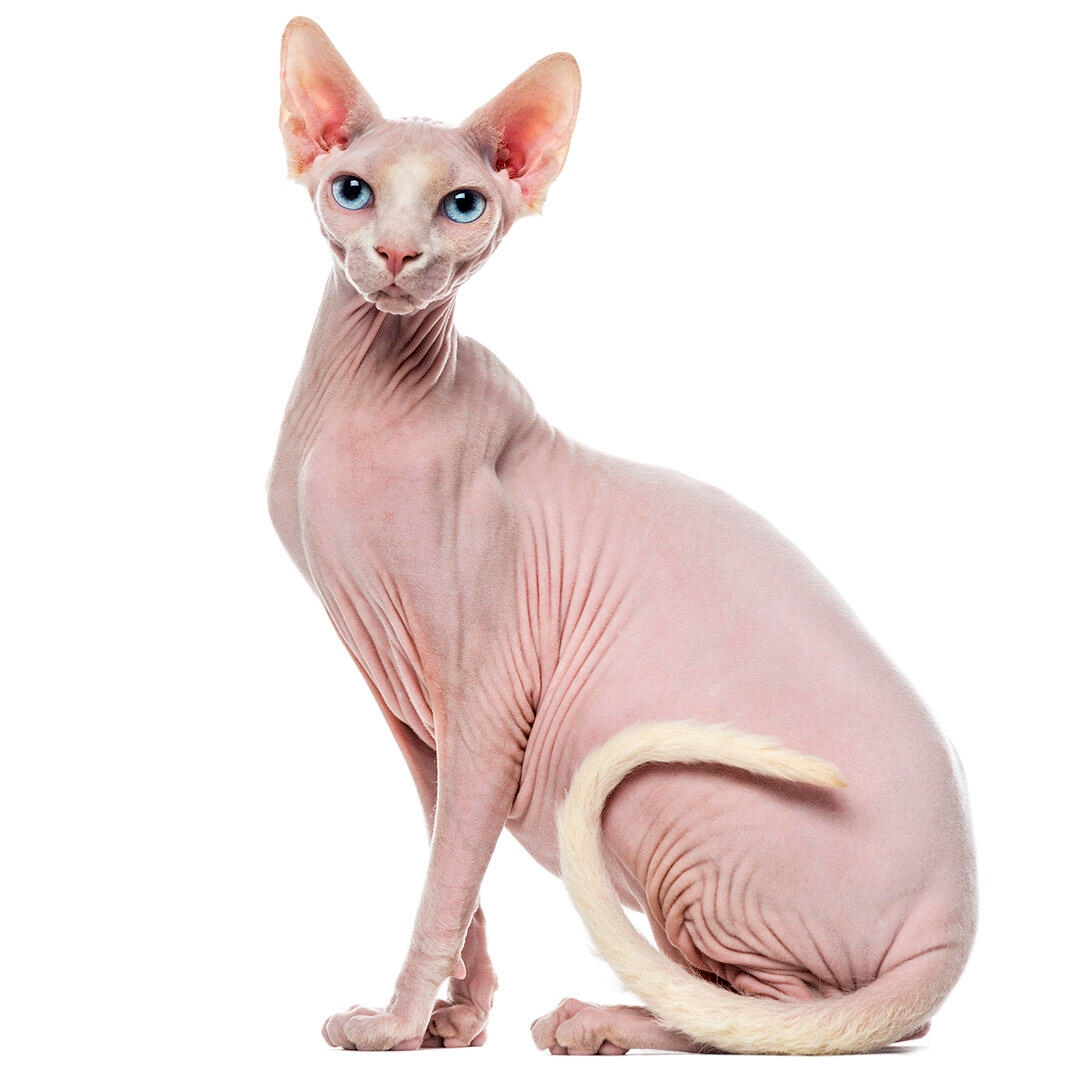
| Family-friendly: | 3/5 |
| Playfulness: | 4/5 |
| Intelligence: | 4/5 |
| Tendency to vocalise: | 5/5 |
| Likes Other Pets: | 2/5 |
| Grooming needs: | 3/5 |
| Shedding: | 1/5 |
The Sphynx cat breed is more likely to develop skin infections and sunburn due to the fact they lack a fur coat.
The breed can also suffer from:
- Hypertrophic cardiomyopathy which is a disease were the heart muscle becomes abnormally thick which means the heart cannot beat effectively.
- Congenital myasthenic syndrome which can cause muscle weakness and nervous signs.
Another extrovert type, the Sphynx is an energetic, highly intelligent, curious and affectionate cat, described by many as being almost dog-like in their friendliness to both family and strangers. They are extremely outgoing, crave attention and will want to be involved in everything you do, to the point of potentially being irritating and in the way – be prepared to be supervised and assisted in all matters around the home, from paperwork to DIY, cooking to taking a bath!
The Sphynx is also unusual in that they are extremely gregarious and will enjoy the company of other animals, particularly other Sphynx cats – note that this doesn’t mean they will entertain themselves, it means you will have several Sphynx cats supervising and assisting you at all times!
Not unexpectedly for a hairless cat, they do like warmth and so can be extremely cuddly and enjoy sneaking under the duvet given half a chance!
| Family-friendly: | 3/5 |
| Playfulness: | 4/5 |
| Intelligence: | 4/5 |
| Tendency to vocalise: | 5/5 |
| Likes Other Pets: | 2/5 |
| Grooming needs: | 3/5 |
| Shedding: | 1/5 |
These hairless cats were discovered in 1966 when a genetic mutation produced a hairless kitten in a litter of domestic shorthair cats in Ontario, Canada. There have been hairless cats known throughout history - in fact the Aztecs were said to keep them - and the hairless gene wherever it occurs (known also in dogs, guineapigs, mice and rats) has always appealed to some humans as an attractive feature to selectively breed for in pet animals.
Most of the modern Sphynx cats today are descended from two kittens found in Minnesota in 1975, and three kittens found in Toronto in the 1978.
Although often described as suitable for allergy sufferers, this is only true of the most hairless examples, and only true if the sufferer is allergic to hair, rather than cat saliva or dander.
Whilst the Sphynx cat is athletic, active and strong, and would love the space the outdoor world provides, the fact is without a protective fur coat they are not suited to outdoor living. Consider this an indoor cat, who requires a warm home, and would benefit from access to a heated ‘catio’ or even from supervised trips outdoors if you have the patience to teach them to walk on a lead and harness.
Being home with you and able to engage and interact with you frequently is the Sphynx cats idea of heaven. Provide plenty of toys, food dispensing puzzles, cat trees and jungle-gyms, but even with this level of in-house entertainment, expect your Sphynx to amuse themselves with classic cat hobbies such as ‘Pushing Things Off Surfaces’ and ‘Running Away with Pens’ and ‘Sitting on Important Documents’. The Sphynx very much needs amusement and the more you provide, hopefully the less your Sphynx will go ‘self-employed’. You can train Sphynx cats using positive reinforcement, but they retain a strong sense of humour and mayhem, which you’ll need to embrace fully to be a happy Sphynx cat owner.
Every cat is unique and each has their own particular likes, dislikes, and needs when it comes to food. However, cats are carnivores and every cat must obtain 41 different and specific nutrients from their food. The proportion of these nutrients will vary depending on age, lifestyle and overall health, so it's not surprising that a growing, energetic kitten needs a different balance of nutrients in her diet than a less active senior cat. Other considerations to bear in mind are feeding the right quantity of food to maintain 'ideal body condition' in accordance with feeding guidelines and catering to individual preference regarding wet or dry food recipes.
The Sphynx cat’s sparse fur and skin does need regular bathing and maintenance so get your kitten used to being bathed or sponged, and particularly to having ears cleaned, from a very young age so that this is an enjoyable bonding time and not a battle. As with all cats, this breed needs regular vaccinations, parasite control and annual health checks.
For those like an extreme cat, who requires more attention than the average feline, the Sphynx may be ideal, however they are not brilliant with very young children and they do need access to a variety of warm spots, beds to snuggle up in, and heating on in cooler weather. Not for the chilly home with doors and windows open all year round!